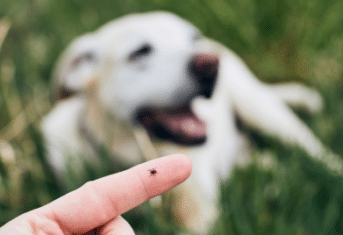Doc, My Dog is Shaking

Doc, My Dog is Shaking
Like the Jerry Lee Lewis song, some dogs “got a whole lotta shakin’ goin’ on.” If your dog is shaking, a trip to the veterinarian is in order. Below you will find a list of some of the more common causes of canine shaking. Please note, some of these are emergency conditions and should prompt a rapid trip to the veterinarian.
A Shaking New Mom
Gestating a litter of puppies requires a large metabolic effort as does nursing hungry pups. When a mother dog begins producing milk, a large amount of calcium is required. This shift of calcium into the milk leaves the rest of the body depleted. The mother dog may be observed to neglect her puppies, act nervous, pant and exhibit stiffness or whole body tremors as a result of the low calcium. This is an emergency and in the animal ER, calcium is administered intravenously to correct the problem. Postpartum low blood calcium (hypocalcemia) is most common in small breed dogs and with first litters.
Toxicity Shaking
The top reason for calls to animal poison control is accidental ingestion of medications, many which can cause shaking. Inadvertent contact with pesticides, snail bait, moldy food or compost, and the most dangerous of all, antifreeze are all associated with shaking. When you take your shaking dog to the veterinarian, be prepared to answer questions about exposure to these inciters of shaking.
Sick and Shaking
The adrenal glands are small, typically only a few millimeters in length, but when they stop functioning as in Addison’s disease, a serious illness results. Addison’s disease is more properly termed hypoadrenocortism and when the adrenal glands stop producing essential hormones, electrolytes like sodium and potassium become abnormal. Since these electrolytes are critical for normal nerve and muscle function, dogs with hypoadrenocortism frequently shake in addition to being weak and lethargic. Many dogs with hypoadrenocortism develop vomiting and diarrhea.
Weak and Shaking
In addition to the role electrolytes play in controlling nerve and muscle function, blood sugar (glucose) levels play a similar role. When blood sugar drops too low, your dog will become weak, have muscle spasms, lose consciousness and may also have a full blown seizure. In their most severe form, seizures from low blood sugar (hypoglycemia) cause recumbency, paddling of the limbs, chomping of the teeth and can also result in urination and defecation. The sole source of fuel to power the brain is glucose and without glucose the brain malfunctions.
Finally, Shaking White Dogs
One of the strangest shaking dog syndromes is little white shaker disease. Named for the little white dogs like Maltese, Westies and Bichons that commonly develop this strange syndrome, a dog of any coat color can develop white shaker disease. The whole body tremors characteristic of this disease are terrifying for pet families. Despite the frightening appearance of affected dogs, most recover following treatment with oral medications.
So while a whole lotta shakin’ might be fun with Jerry Lee Lewis, you can see a shaking dog is not so much fun. See your veterinarian if your dog has the shakes, unless of course it is a happy shake because you just came home!































